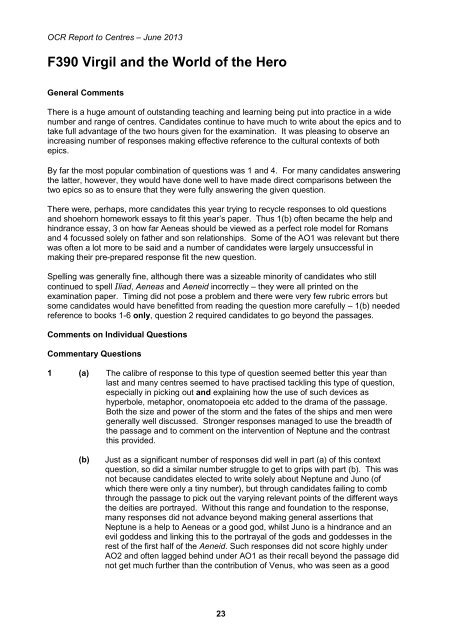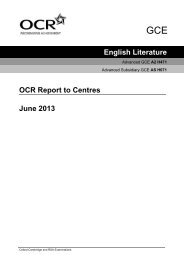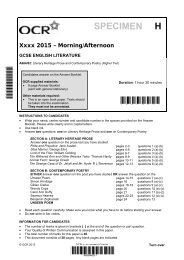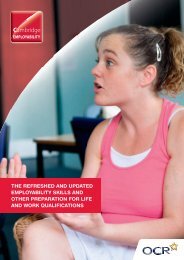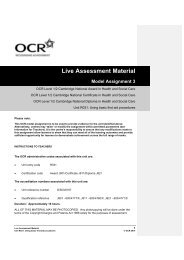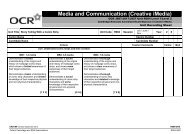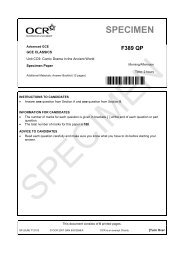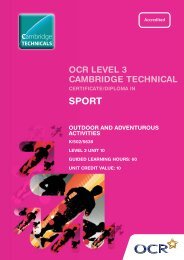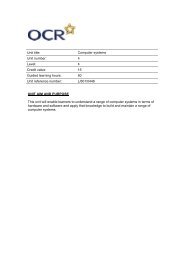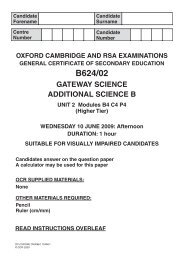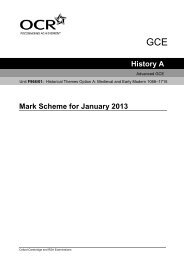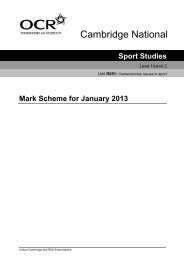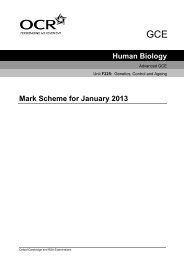Examiners' reports - June (PDF, 440KB) - OCR
Examiners' reports - June (PDF, 440KB) - OCR
Examiners' reports - June (PDF, 440KB) - OCR
You also want an ePaper? Increase the reach of your titles
YUMPU automatically turns print PDFs into web optimized ePapers that Google loves.
<strong>OCR</strong> Report to Centres – <strong>June</strong> 2013<br />
F390 Virgil and the World of the Hero<br />
General Comments<br />
There is a huge amount of outstanding teaching and learning being put into practice in a wide<br />
number and range of centres. Candidates continue to have much to write about the epics and to<br />
take full advantage of the two hours given for the examination. It was pleasing to observe an<br />
increasing number of responses making effective reference to the cultural contexts of both<br />
epics.<br />
By far the most popular combination of questions was 1 and 4. For many candidates answering<br />
the latter, however, they would have done well to have made direct comparisons between the<br />
two epics so as to ensure that they were fully answering the given question.<br />
There were, perhaps, more candidates this year trying to recycle responses to old questions<br />
and shoehorn homework essays to fit this year’s paper. Thus 1(b) often became the help and<br />
hindrance essay, 3 on how far Aeneas should be viewed as a perfect role model for Romans<br />
and 4 focussed solely on father and son relationships. Some of the AO1 was relevant but there<br />
was often a lot more to be said and a number of candidates were largely unsuccessful in<br />
making their pre-prepared response fit the new question.<br />
Spelling was generally fine, although there was a sizeable minority of candidates who still<br />
continued to spell Iliad, Aeneas and Aeneid incorrectly – they were all printed on the<br />
examination paper. Timing did not pose a problem and there were very few rubric errors but<br />
some candidates would have benefitted from reading the question more carefully – 1(b) needed<br />
reference to books 1-6 only, question 2 required candidates to go beyond the passages.<br />
Comments on Individual Questions<br />
Commentary Questions<br />
1 (a) The calibre of response to this type of question seemed better this year than<br />
last and many centres seemed to have practised tackling this type of question,<br />
especially in picking out and explaining how the use of such devices as<br />
hyperbole, metaphor, onomatopoeia etc added to the drama of the passage.<br />
Both the size and power of the storm and the fates of the ships and men were<br />
generally well discussed. Stronger responses managed to use the breadth of<br />
the passage and to comment on the intervention of Neptune and the contrast<br />
this provided.<br />
(b)<br />
Just as a significant number of responses did well in part (a) of this context<br />
question, so did a similar number struggle to get to grips with part (b). This was<br />
not because candidates elected to write solely about Neptune and Juno (of<br />
which there were only a tiny number), but through candidates failing to comb<br />
through the passage to pick out the varying relevant points of the different ways<br />
the deities are portrayed. Without this range and foundation to the response,<br />
many responses did not advance beyond making general assertions that<br />
Neptune is a help to Aeneas or a good god, whilst Juno is a hindrance and an<br />
evil goddess and linking this to the portrayal of the gods and goddesses in the<br />
rest of the first half of the Aeneid. Such responses did not score highly under<br />
AO2 and often lagged behind under AO1 as their recall beyond the passage did<br />
not get much further than the contribution of Venus, who was seen as a good<br />
23


